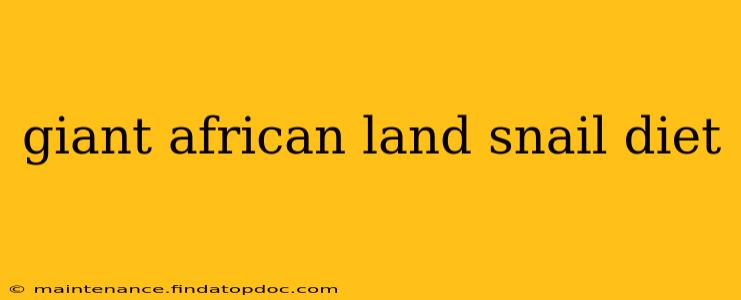The Giant African Land Snail ( Lissachatina fulica), a large terrestrial gastropod, boasts a surprisingly diverse diet. Understanding their nutritional needs is crucial for responsible pet ownership or managing populations in areas where they're an invasive species. This comprehensive guide delves into the specifics of what these fascinating creatures eat, addressing common questions and misconceptions.
What do Giant African Land Snails eat?
Giant African land snails are herbivores, primarily consuming plants and plant-based materials. Their diet is incredibly varied, encompassing a wide range of fruits, vegetables, and other plant matter. A balanced diet is crucial for their health and growth. They are known for their voracious appetites, consuming significant amounts of food relative to their size.
What fruits and vegetables can Giant African Land Snails eat?
The good news is, many common fruits and vegetables make excellent additions to a Giant African Land Snail's diet. Here are some favorites:
- Fruits: Bananas, apples (without seeds), melons (cantaloupe, watermelon), strawberries, mangoes, peaches, and papaya. Offer fruits in moderation due to their sugar content.
- Vegetables: Cucumbers, zucchini, bell peppers (all colors), carrots (shredded or sliced), lettuce (various types), spinach, and sweet potatoes.
- Other Plant Matter: They also enjoy mushrooms, flower petals (ensure they're pesticide-free!), and certain leafy greens like dandelion greens and kale.
Remember to always wash all fruits and vegetables thoroughly before feeding them to your snails.
What foods should you NOT feed Giant African Land Snails?
Certain foods can be harmful or even fatal to Giant African Land Snails. Avoid feeding them:
- Citrus fruits: These are highly acidic and can damage their digestive systems.
- Salty foods: Salt is toxic to snails.
- Processed foods: Avoid anything containing artificial sweeteners, preservatives, or excessive seasonings.
- Meat and dairy products: Giant African Land Snails are herbivores and cannot digest animal products.
- Foods with high levels of oxalates: Foods like rhubarb and spinach in large quantities can interfere with calcium absorption. Moderation is key here.
Always err on the side of caution and research any new food before introducing it to your snail's diet.
What is the best diet for a Giant African Land Snail?
The best diet for a Giant African Land Snail is a diverse one, mimicking their natural food sources. A varied mix of fruits, vegetables, and other plant matter ensures they receive a balanced intake of essential nutrients. A good rule of thumb is to offer a variety of options daily, changing up the selections to prevent boredom and nutrient deficiencies. Consider supplementing with a calcium source, like cuttlebone, to support shell growth.
How often should I feed my Giant African Land Snail?
Feeding frequency depends on the size and age of your snail. Young snails require more frequent feeding than adults. Generally, offering food once a day is sufficient, ensuring any uneaten food is removed to prevent mold and bacterial growth. Observe your snail's eating habits – adjust the amount based on how much they consume.
What are the signs of a Giant African Land Snail with nutritional deficiencies?
Signs of nutritional deficiencies can include slow growth, a weak or brittle shell, lethargy, and a lack of appetite. If you notice any of these signs, consult a veterinarian specializing in exotic animals or an experienced snail keeper. Review your snail's diet and ensure it's varied and contains sufficient calcium.
Can Giant African Land Snails eat cardboard or paper?
While some sources suggest snails may consume small amounts of cardboard to supplement their calcium intake, this should be avoided. Cardboard can contain harmful chemicals and is not a reliable source of nutrition. Cuttlebone is a much safer and more effective calcium supplement.
What are the health risks associated with an improper diet for Giant African Land Snails?
An improper diet can lead to numerous health problems, including shell deformation, slow growth, metabolic bone disease (MBD), and increased susceptibility to infections. A balanced and varied diet is paramount to the health and longevity of your Giant African Land Snail. Providing a nutritionally deficient diet can significantly reduce the snail's quality of life and lifespan.
By following these guidelines and ensuring a diverse, balanced diet, you can contribute to the health and well-being of your Giant African Land Snail. Remember that observation is key—monitor your snail's behavior and eating habits to fine-tune its diet as needed.
